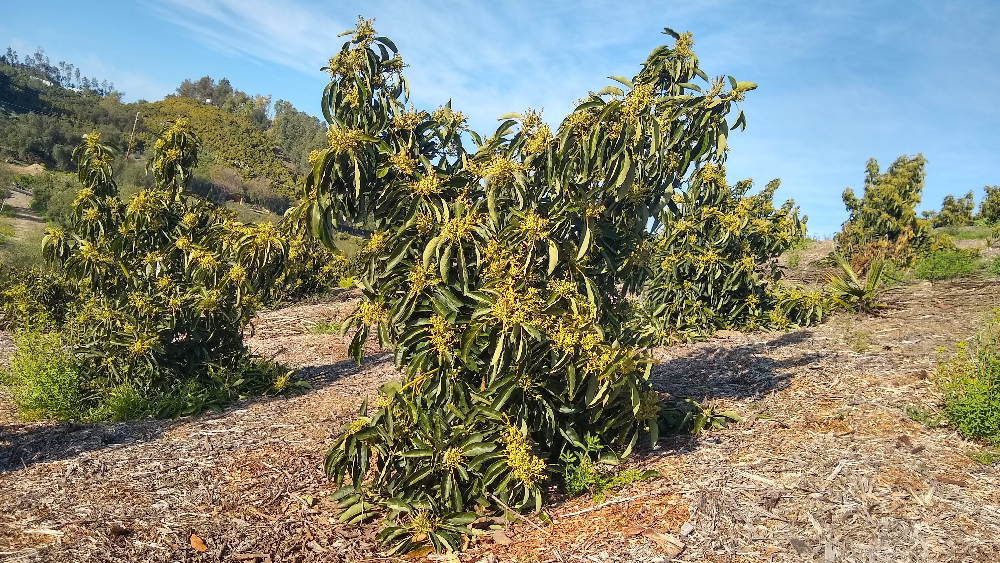Can you mulch avocado trees too much? I’m sure you can, but I’ve never seen such a thing. And I’ve seen trees surrounded by deeeeeeep wood chips, like these on John Schoustra’s farm in Somis, Ventura County:
The evidence of the beautiful leaves and abundant bloom on these trees speaks for itself as to whether the trees are mulched too heavily, but I should add that John does not fertilize them in any way. He’s never added fertilizer. He keeps the wood-chip mulch thick, that’s it.
But he does also encourage plants to add to the life in the soil and the beneficial insects above ground. Some of these plants are considered weeds by others. John says, “We like Hairy Vetch, Sweet Clover, Telegraph Weed, Lupine and even mustard.”
John and his wife Cynthia grow avocados adjacent to their Greenwood Daylily Gardens.
Thanks for your support so I can keep these Yard Posts coming and ad-free.
All of my Yard Posts are listed HERE.




Thanks for featuring my approach, Greg. I would add that I encourage cover plants to add life to the soil and host beneficial insects. (Not obvious in this spot.) We like Hairy Vetch, Sweet Clover, Telegraph Weed, Lupine and even mustard.
Hi John ,
I definitely agree with mulching , although I do a very small amount of Tru organic fertalizer as well. The cover crop I found that attracts gophers is the sweet clover, they love that. I’m a rookie growing Avocados and others in Valley Center.
Hi Greg,
I’m glad you brought up the fertilizing. What I find when I talk to avocado growers is that they are afraid to NOT fertilize even if they also add a lot of mulch. What I encourage them to try, especially on trees more than a couple years old, is to go a year without the fertilizer to see how the tree does. Keep up the mulch but forego the fertilizer for just a year.
This is a line of investigation that I’m very interested in, and I’ve been doing informal comparisons for years, and so far I have found zero evidence that the fertilizers improve the performance of trees that are well mulched.
That said, I totally understand why people are afraid to not fertilize. It has been drummed into us that our trees can’t thrive without it.
Good morning John,
I’ll go ahead and add this to the post above.
Doesn’t thick mulch prevent a fair amount of rainwater reaching deep into the soil? Do you need to water with a drip system if heavily mulching?
Hi David,
Great questions. A thick mulch does soak up a lot of rainfall. But after the mulch is soaked, all further rainfall goes through it and below it. So if the mulch is applied in the winter, usually no irrigation is needed and the rain will be enough to thoroughly soak the mulch and get down to the roots. If the mulch is applied in the spring, summer, or fall, right after application it is usually necessary to irrigate as long as it takes until the water gets through the mulch to the roots below, whether you’re using drip or sprinklers or sprayers. (The grove in the video uses sprayers.) After that initial irrigation, no extra water needs to be applied.
Thank you!
I’ve had a four foot tall pile of rotting sticks, dead plants, grass trimmings, etc. right next to a GEM avocado for years. I have no doubt that its roots have infiltrated the pile which gets soaked periodically to keep it breaking down. Otherwise it would be about 25 feet tall! The tree is blooming like crazy right now and serving up lots of bee chow.
I wonder if we can generalize here and say that all plants do not need fertilizer when properly mulched. There was a lady way back named Ruth Stout who grew lush vegetables in nothing but spoiled hay.
Hi Joshua,
Ruth Stout was a great character. I love the old interviews with her.
I think that we can generalize in that way, with a couple of notes. Mulch takes time to break down into bits that plants can use; therefore, if the soil is lacking in fertility, mulch will only rectify that if given enough time. Also, a few plants have stricter needs for pH. For example, I tried to get away with just mulch on blueberries for years but the plants became much happier once I added sulfur to lower the pH.
I always mulch with Tree Chips and often leave a few piles of the extras. These can be a couple feet high and when I go to get some from these piles I find tree roots up into the piles! The trees love it. I also don’t fertilize except one tree that was planted in a limestone layer. Even that one has only been fertilized twice in 6 years.
Hi Gregory,
I’ve seen this too! In fact, I’ve stopped bothering to spread my mulch under some trees; I just leave it in a pile next to the tree. Saves time and the trees utilize it just as well. Michael Phillips also talks about doing this in his book “The Holistic Orchard.”
I have a Hass Avacoda tree that is Five years ola and was transplanted 1 1/2 years ago , it struggled thru last summer but is looking good . The last Three weeks has been seasonably warm during the day55-70 degrees and Mid 30s at night, I would like to add compost and mulch on top but not sure if it’s too early in the year. We still have a lot of cold weather coming!
Hi Greg, thanks as always for the post.
Any benefit of using wood chips or Tree Chips (not sure exactly what this is) vs. a generic shredded mulch from a soil yard?
Hi Al,
This is a good question, but it is also one that’s hard to answer. You’d want to know what the ingredients of the “mulch” is. Sometimes it’s just wood, sometimes just bark.
But the best stuff contains all parts of a tree: wood, bark, small branches, leaves. This is best because it forms a nice layer that breaks down but not too quickly, and it has enough air but not only huge air pockets.
That said, I have friends in urban areas that have a hard time getting full-tree wood chips so they just put the bagged stuff (mostly wood) under their avocados and it still helps a lot, especially in clay soil. The trees soon grow roots up into those wood chips and the trees begin looking better.